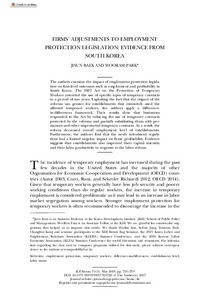Firms' adjustments to employment protection legislation: evidence from South Korea

2018
71
3
May
733-759
employment security ; legislation ; temporary employment
Employment
https://doi.org/10.1177%2F0019793917728720
English
Bibliogr.
" The authors examine the impact of employment protection legislation on firm-level outcomes such as employment and profitability in South Korea. The 2007 Act on the Protection of Temporary Workers restricted the use of specific types of temporary contracts to a period of two years. Exploiting the fact that the impact of the reforms was greater for establishments that intensively used the affected temporary workers, the authors apply a difference-in-differences framework. Their results show that businesses responded to the Act by reducing the use of temporary contracts protected by the reforms and partially substituting them with permanent and other unprotected temporary contracts. As a result, the reform decreased overall employment level of establishments. Furthermore, the authors find that the newly introduced regulations had a limited negative impact on firms' profitability. Evidence suggests that establishments also improved their capital intensity and their labor productivity in response to the labor reform."
Digital;Paper
The ETUI is co-funded by the European Union. Views and opinions expressed are however those of the author(s) only and do not necessarily reflect those of the European Union or the ETUI.